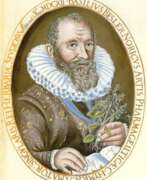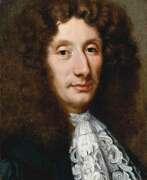Pharmacists
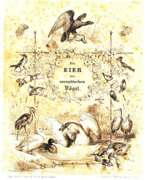

Friedrich Baedeker, full name Friedrich Wilhelm Justus Baedeker or F. W. J. Baedeker, was a German pharmacist, bird egg collector and bird illustrator.
In addition to his work as a pharmacist, Baedeker had a passion for ornithology and was a good artist. His 774 watercolors are known, depicting some 386 European birds. In time, Baedeker became widely known as an ornithologist and zoologist, and his huge collection included about 4,000 eggs of various European and exotic birds.
Baedeker joined the Deutsche Ornithologen-Gesellschaft (German Society of Ornithologists) in 1851, shortly after its founding, and published several books on birds. One of these was Die Eier der europaeischen Voegel nach der Natur gemalt ("The Eggs of European Birds Drawn from Nature").
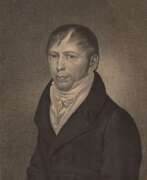

Friedrich Gottlob Hayne was a German botanist, taxonomist, pharmacist and professor.
After many years of teaching, he was appointed Professor of Pharmaceutical Botany in 1828. In addition to his lecturing duties he led many botanical excursions. He was known for using precise terminology in his plant descriptions.
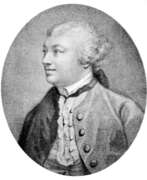

John Hill was a British botanist, pharmacologist and physician, geologist, writer and journalist.
Hill edited the monthly British Magazine for several years, and also wrote a daily society gossip column in The London Advertiser and Literary Gazette. His satirical, often on the edge of propriety articles were often the cause of scandals. Hill also wrote novels, plays, and scientific works on geology, medicine, philosophy, and botany.
In 1759, the first of the 26 volumes of his Plant System was published. This voluminous work contained descriptions of 26,000 different plants and 1,600 illustrations. For this long work, Hill received the Order of Vasa from the Swedish king and began calling himself Sir.
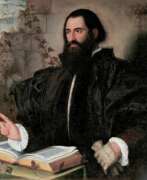

Pietro Andrea Gregorio Mattioli was a 16th-century Italian physician, botanist and pharmacist.
Mattioli studied medicine in Padua and obtained a medical practice first in his hometown. Later, in the 1555-1560s, he served as personal physician to the imperial court of Ferdinand II, Archduke of Austria, and Emperor Maximilian II. This high position allowed him to test the effects of poisonous plants on prisoners for scientific purposes.
Mattioli published several scientific works in which he included many of his own observations on the flora of the Alps, including previously unexplored plants. These works, based on the study of books by predecessor scientists, gave impetus to the development of botany throughout Italy at the time. Mattioli kept up a lively correspondence with other researchers, describing specimens of rare plants received from them. The genus of flowering plants Matthiola is named after Mattioli.
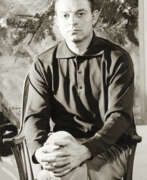

Armin Mehling was a German artist and pharmacist. Known for his versatility, Mehling merged his scientific acumen with artistic flair, producing a diverse array of artworks that included oil paintings, watercolors, mixed media, and collages. Armin Mehling's contributions to the art world have not gone unnoticed, as his pieces frequently appear in art auctions, drawing the attention of collectors and art aficionados alike.
Armin Mehling's artistic journey is a testament to the harmonious blend of precision and creativity, characteristics derived from his dual careers. This multifaceted nature of his art has ensured Mehling's continued relevance in the art market, where his creations continue to resonate with a broad spectrum of art lovers.
For collectors and experts in art and antiques, Armin Mehling's story is not just about the art he created but also about the intriguing interplay between two distinct disciplines. His art, marked by its abstract and diverse nature, invites viewers to explore the depth of his creativity and the breadth of his skill set.
Sign up now for exclusive updates on Armin Mehling's artworks and upcoming auction events. Stay connected with the pulse of the art market and never miss an opportunity to delve into the world of a remarkable artist who bridged the realms of art and science with unparalleled grace.
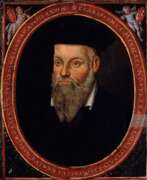

Nostradamus (French: Michel de Nostredame) was a French physician-pharmacist, writer, poet, astrologer and alchemist.
Nostradamus was born into a family of baptized Jews and studied various sciences in Avignon. At that time the plague was rampant in Europe, and Nostradamus decided to become a healer, in 1526 he even invented an anti-plague medicine, and later received a degree of Doctor of Medicine. He began his medical practice around the 1530s in Agen. During the plague outbreaks in Aix and Lyon in 1546-1547, he gained fame for his innovative treatments. Nostradamus described his methods of dealing with epidemics in several medical works. In addition to medicine, he also practiced astrology.
Nostradamus gained worldwide fame thanks to his gift as a seer. He began making prophecies around 1547 and first published them in 1555 in a book called Centuries. The book was written in rhymed quatrains - catrines - with predictions of future events in European history. Some of his prophecies were close to the truth, and the fame of the visionary Nostradamus reached the court of Catherine de Medici, who ordered him to compile horoscopes of her children. In 1564 he was appointed physician to Charles IX, to whom he also made several predictions that came true.
Nostradamus's book of prophecies was a huge success, and it still arouses interest, but he wrote allegorically and many of the katrines cannot be interpreted unambiguously.
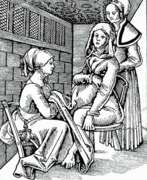

Eucharius Rösslin the Elder or Eucharius Rößlin was a German medieval scholar, physician-midwife, and pharmacist.
In 1493 Eucharius became apothecary in Freiburg, and 13 years later was elected physician of the city of Frankfurt am Main. From there he moved to Worms, in the service of Katherine, Princess of Saxony and Duchess of Brunswick and Lüneburg. One of his duties was to oversee and supervise the city's midwives, whose ignorance led to a high infant and female mortality rate.
In order to remedy this, Eucharius wrote and published a book on midwifery called Der Rosengarten ("The Rose Garden for Pregnant Women and Midwives") in Strasbourg in 1513. It was in German and contained several engravings. The book proved very popular and soon became the standard medical textbook for midwives. For nearly two centuries it was the authoritative guide to midwifery in Europe, translated into seven languages and reprinted over a hundred times.
In 1517 Rösslin returned to work in Frankfurt and remained in that position until his death in 1526. His son, also named Eucharius Rösslin, succeeded him as city physician.
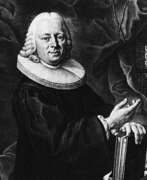

Jacob Christian Schäffer was a German inventor, naturalist, entomologist and mycologist.
Schäffer was a very versatile scientist. He is best known for his work in mycology (the study of fungi), but his most important publication was undoubtedly a book on daphnia or water fleas.
Schäffer also published reference books on pharmaceuticals and medicinal herbs. He conducted experiments on electricity, colors, and optics, and invented the manufacture of prisms and lenses. He invented the washing machine, designs for which he published in 1767, and studied ways to improve paper production.
Schäffer was a professor at the Universities of Wittenberg and Tübingen, a member of the Royal Society of London, and a correspondent of the French Academy of Sciences.
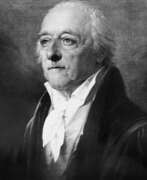

Nikolaus von Jacquin, full name Nikolaus Joseph Freiherr von Jacquin, also Baron Nikolaus von Jacquin, was an Austrian and Dutch scientist, professor of chemistry and botany, and director of the Vienna Botanical Garden.
Jacquin is considered a pioneer of scientific botany in Austria. He wrote fundamental works in botany, was the first to describe many plants, fungi, and animals, introduced experimental methods in chemistry, and successfully campaigned for the introduction of Linnaeus' system of plants in Austria. On behalf of Emperor Franz I, von Jacquin was in charge of the imperial gardens (including Schoenbrunn) and also led a scientific expedition to Central America from 1754 to 1759, from which he returned with an extensive collection of plants.
In 1768, Nikolaus von Jacquin was appointed professor of botany and chemistry at the Faculty of Medicine of the University of Vienna and director of the newly founded botanical garden, which he reorganized according to scientific principles. Nikolaus von Jacquin was a member of the Royal Society of London, a foreign honorary member of the St. Petersburg Academy of Sciences, and a correspondent of the Paris Academy of Sciences.
